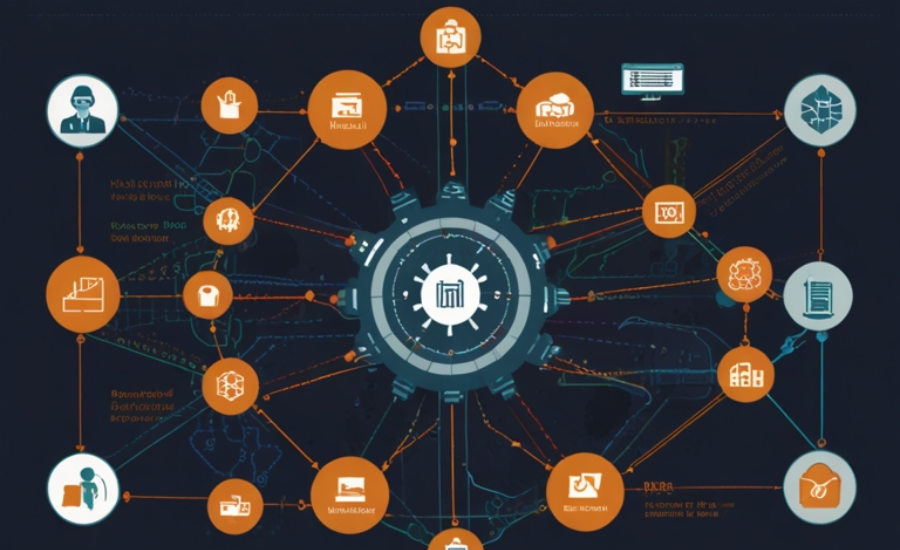IBM Integration Bus (IIB), previously known as WebSphere Message Broker, is a sophisticated middleware solution widely used by businesses to streamline communication between disparate applications and systems. iib_api_server.exe what is? Central to the seamless operation of IIB is a crucial executable file known as iib_api_server.exe. This component plays a vital role in API-driven communication and message processing, facilitating the smooth exchange of data between different applications, both within the cloud and on-premise environments. Its significance cannot be overstated, as it contributes to an optimized IT ecosystem by ensuring secure, efficient, and timely data flows.
This article delves into the core functionalities of iib_api_server.exe what is? , explaining its role in the broader context of IBM Integration Bus, its essential features, and the best practices for ensuring its optimal performance. Additionally, we will explore why this executable is indispensable for enterprises seeking to integrate and automate their IT operations effectively.
Understanding IBM Integration Bus and the Role of iib_api_server.exe

IBM Integration Bus (IIB) serves as a comprehensive integration solution for enterprises that require efficient data communication between different systems. It supports a range of messaging protocols, such as SOAP, REST, MQ, and JSON, allowing organizations to integrate disparate services seamlessly. The architecture of IIB is designed to facilitate data routing, transformation, and enrichment, enabling businesses to automate workflows and manage complex integration processes with ease.
At the heart of this architecture lies iib_api_server.exe, an executable file that is responsible for executing the API server processes within IBM Integration Bus. This file is crucial for handling API requests, transforming data formats, and ensuring secure communication across multiple endpoints. By managing API-driven communication, iib_api_server.exe allows different applications to interact with one another, facilitating smooth data exchange in real-time.
How iib_api_server.exe Works: API Communication and Message Processing
The primary function of iib_api_server.exe is to handle API-driven communication and ensure that messages are routed to the correct destinations. When an API request is received, iib_api_server.exe intercepts the request and processes it according to predefined rules. These rules might include transforming data formats (e.g., converting XML to JSON), enriching the data, or routing the data to the appropriate backend system for further processing.
Furthermore, iib_api_server.exe guarantees that data is transmitted securely between systems, ensuring that sensitive information is protected during the exchange. This is particularly important in today’s enterprise landscape, where data security is a priority, and integration solutions must adhere to stringent compliance standards.
Key Features and Functions of iib_api_server.exe
- Message Routing: One of the key responsibilities of iib_api_server.exe is to route messages between different applications and systems. This ensures that the data reaches its intended destination without any delay, minimizing communication disruptions and contributing to a smooth IT environment.
- Data Transformation: iib_api_server.exe plays an essential role in transforming data between different formats. Whether converting XML to JSON or applying other data transformations, this executable ensures that data can be processed by different systems, even if they rely on different data formats. This feature is critical in environments where legacy systems must integrate with modern applications.
- Real-Time Data Processing: In modern business environments, real-time data processing is a necessity. iib_api_server.exe processes data as it flows through the system, ensuring that there is no delay in the delivery and transformation of data. This capability is crucial for businesses that rely on timely information for decision-making.
- API Management: iib_api_server.exe is also responsible for managing API requests. It ensures smooth communication between internal and external systems, enabling businesses to leverage APIs as part of their broader integration strategy.
Integration and Data Communication in Middleware Systems

Middleware is the backbone of modern IT infrastructure, providing a layer of communication between different applications, services, and systems. Middleware solutions like IBM Integration Bus and iib_api_server.exe ensure that businesses can manage data flows, automate workflows, and enable communication between systems, regardless of the platform or environment.
For enterprises that depend on high volumes of data traffic, middleware solutions like IIB and iib_api_server.exe are essential for ensuring uninterrupted data flow. Middleware components help reduce the complexity of managing large-scale IT environments by offering an abstraction layer that simplifies integration.
Why is iib_api_server.exe Crucial for Enterprise Middleware?
- Scalability: As businesses grow and their IT infrastructure becomes more complex, the need for scalable middleware solutions becomes apparent. iib_api_server.exe provides the flexibility required to integrate new systems and services without disrupting the existing architecture. This scalability is essential for organizations that are constantly evolving and need a solution that can grow with them.
- High-Volume Data Traffic: In large enterprises, the ability to handle high volumes of data is crucial. iib_api_server.exe is designed to manage large-scale data flows efficiently, ensuring that data is processed quickly and accurately even during peak traffic periods. This is particularly important for businesses that rely on real-time data processing to drive business operations.
- Data Security: With sensitive data being transferred across multiple endpoints, security is of paramount importance. iib_api_server.exe ensures that data is protected through encryption and secure communication protocols. By using SSL/TLS for encrypted communication and OAuth for secure API access, iib_api_server.exe helps businesses safeguard their data against unauthorized access.
- Workflow Automation: Middleware solutions like IBM Integration Bus and iib_api_server.exe enable businesses to automate workflows, which is critical for improving efficiency and reducing manual errors. By routing and transforming data automatically, iib_api_server.exe reduces the need for human intervention, allowing organizations to focus on more strategic tasks.
Performance Optimization for iib_api_server.exe
While iib_api_server.exe is a robust component of IBM Integration Bus, performance issues can occasionally arise. Common issues include network latency, resource allocation problems, and configuration conflicts. To optimize performance, IT administrators must ensure that the system supporting iib_api_server.exe has sufficient resources (memory, CPU, etc.) to handle high volumes of data and API requests.
Additionally, network performance must be carefully monitored. Slow or unreliable network connections can significantly impact the efficiency of iib_api_server.exe, leading to delays in data transfers and processing. By regularly monitoring system performance and making necessary adjustments, administrators can ensure that iib_api_server.exe operates at peak efficiency.
Best Practices for Managing and Securing iib_api_server.exe

- Regular Monitoring: Continuous monitoring of iib_api_server.exe is essential to identify potential performance bottlenecks. Tools like logging and monitoring frameworks can help administrators pinpoint issues early, allowing for quick remediation.
- Security Measures: To protect iib_api_server.exe from unauthorized access, businesses should implement robust security protocols, including role-based access control (RBAC) and API management tools. This ensures that only authorized users and systems can interact with the executable.
- Resource Allocation: Ensuring that sufficient system resources are allocated to iib_api_server.exe is crucial for maintaining optimal performance. Regularly updating hardware, optimizing database queries, and adjusting message queues can help reduce the risk of performance degradation.
- Data Encryption and Authentication: As iib_api_server.exe handles critical business data, it’s vital to ensure that data is transmitted securely. Businesses should leverage advanced security protocols such as SSL/TLS encryption and OAuth for secure API access to protect sensitive information.
Best Practices for Maintaining Optimal Performance in IT Systems
To ensure peak performance in enterprise systems, businesses must adopt key best practices that address resource management, system health, and software updates. Following these practices will not only maintain efficiency but also support long-term system stability and security.
1. Regular Monitoring
Continuous monitoring is critical to identify and resolve potential issues before they escalate. Implementing comprehensive monitoring tools allows businesses to keep track of various system metrics, including CPU usage, memory consumption, message processing times, and system health. These tools provide real-time insights into system performance, enabling IT administrators to take swift corrective actions if resource thresholds are exceeded. By proactively identifying bottlenecks or underutilized resources, companies can optimize their infrastructure for maximum output.
2. Optimize Configuration
Maintaining optimal performance starts with ensuring that the system configuration is correctly set up. Regular audits of configurations are essential for identifying inefficiencies. For example, ensuring that key system components, such as the IBM Integration Bus (IIB) and related processes, are configured for maximum efficiency can significantly reduce overhead. Administrators should review and fine-tune settings like memory allocations, message queue configurations, and thread management to match the evolving demands of the business.
3. Regular Software Updates
Keeping software, including critical components like IBM Integration Bus (IIB) and its dependencies (such as iib_api_server.exe), up to date with the latest patches and updates is essential. Not only do updates provide new features and functionality, but they also enhance security, performance, and system stability. Admins should establish a routine for checking for updates, applying patches, and testing updates in controlled environments before deploying them into live production systems.
4. Implement Load Balancing
Load balancing techniques distribute incoming traffic across multiple servers or instances, reducing the load on any single system. This approach is vital for maintaining consistent performance, especially during peak times. Load balancing not only ensures optimal resource usage but also contributes to system reliability by preventing any single point of failure. Additionally, load balancing can help minimize latency and improve user experience by ensuring that no single server becomes a bottleneck.
Compatibility and Updates for iib_api_server.exe
As IBM continues to enhance its software offerings, ensuring that components like iib_api_server.exe remain compatible with newer versions of IBM Integration Bus (IIB) is crucial for maximizing system efficiency. Each new IIB release may introduce additional features, bug fixes, and security improvements, which can significantly enhance performance, security, and compatibility. To ensure seamless integration with the latest version of IBM Integration Bus, businesses should test iib_api_server.exe in a controlled environment before upgrading.
Testing Compatibility with Third-Party Systems
IBM Integration Bus is frequently used to bridge multiple enterprise systems, and ensuring that iib_api_server.exe is compatible with external applications, APIs, and services is essential. Compatibility testing should be done not only within the IBM ecosystem but also in environments where third-party systems are integrated. A lack of compatibility can lead to disruptions in service or communication breakdowns, which can severely impact business operations.
How to Keep iib_api_server.exe Up-to-Date

Regular updates are vital for maintaining both functionality and security in systems relying on IBM Integration Bus and iib_api_server.exe. Keeping this component up-to-date with the latest patches improves not only the performance but also the system’s resilience to emerging security threats.
Updating through IBM App Connect
Administrators can download updates from IBM’s official website or manage them through the IBM App Connect platform. IBM provides tools for managing updates and automating patch management, which ensures that critical updates are applied in a timely manner. This proactive approach helps organizations stay ahead of potential vulnerabilities and ensures that performance enhancements are quickly integrated into production environments.
Testing Before Deployment
Before deploying any updates, it’s crucial to test the new versions in a controlled staging environment that mirrors the production system. This ensures that the updates will not introduce compatibility issues or disrupt the functionality of critical systems. Furthermore, administrators should back up configurations and important data before deploying any updates to safeguard against data loss in the event of an unforeseen issue.
How iib_api_server.exe Enhances Business Operations
One of the core advantages of iib_api_server.exe is its ability to process data in real time, which is particularly beneficial for businesses that need to make rapid decisions based on changing conditions.
Real-Time Data Processing
With the ability to immediately transfer data between systems, businesses can make better-informed decisions, address customer inquiries more effectively, and optimize internal processes. This feature is particularly advantageous in industries such as retail, finance, and healthcare, where quick decision-making can have a significant impact on overall performance.
Automation of Data Workflows and Business Processes
Another significant benefit of iib_api_server.exe is its role in automating complex data workflows and business processes. By utilizing IBM Integration Bus, businesses can automate the routing, transformation, and delivery of messages between systems. This reduces the need for manual intervention, speeds up processes, and minimizes human error.
Streamlining Operations through Automation
For instance, when an order is placed in an online store, iib_api_server.exe can automatically route the data to the appropriate departments—such as inventory, shipping, and customer service—without requiring manual oversight. This creates a more efficient workflow, reduces delays, and ensures that all departments are aligned in real time.
Case Studies of Successful Implementations
Many organizations have successfully leveraged iib_api_server.exe to streamline their operations and improve their service offerings. For example, a major retail chain integrated its inventory management system with its order processing system using IBM Integration Bus. This allowed for real-time stock updates and expedited order fulfillment, which improved customer satisfaction and operational efficiency.
In another instance, a financial services company utilized iib_api_server.exe to integrate their trading platform with external market data providers. This integration ensured that traders had access to the most up-to-date market data, enabling them to make quicker, more accurate decisions in fast-paced markets.
Alternatives to iib_api_server.exe and IBM Integration Bus

While IBM Integration Bus and iib_api_server.exe offer robust integration capabilities, several alternatives are available in the market that may better suit specific business needs or infrastructure requirements. These alternatives include:
Microsoft BizTalk Server
BizTalk Server is a middleware solution designed to facilitate integration between various systems, services, and applications. It offers extensive support for connecting with Microsoft-based platforms, making it ideal for businesses with a heavy reliance on Microsoft technologies.
MuleSoft Anypoint Platform
MuleSoft offers a comprehensive integration platform that supports API management and can integrate both cloud and on-premise systems. Its cloud-native architecture makes it a popular choice for businesses transitioning to the cloud.
WSO2 Enterprise Integrator
WSO2 provides an open-source integration platform that supports API management, data transformation, and message brokering. It is particularly suited for organizations looking for cost-effective integration solutions with a focus on flexibility.
Comparing IBM Integration Bus with Competitors
When evaluating IBM Integration Bus alongside its competitors, it is clear that IIB offers superior flexibility, scalability, and support for various messaging protocols. The introduction of IBM App Connect Enterprise (ACE), the next evolution of IIB, brings even more advanced features, including enhanced API management and integration capabilities.
However, some businesses may prefer alternatives like MuleSoft for its strong focus on cloud integrations or Microsoft BizTalk Server for environments that predominantly use Microsoft products.
Troubleshooting and Common Issues with iib_api_server.exe
Despite its advanced features, iib_api_server.exe is not immune to performance issues. Common problems often stem from resource constraints, network issues, or improper configuration of message flows. To resolve these problems, IT administrators can use logging tools to trace the processing steps of messages and identify where the issues arise.
Resolving Configuration Issues
Improper system configurations can lead to message routing errors, data transformation issues, or even system downtime. Ensuring that all system settings, such as message formats, connection configurations, and security protocols, are correctly configured is crucial for smooth operation.
The Future of iib_api_server.exe in Cloud and Hybrid Environments

With the increasing shift towards cloud computing, integrating iib_api_server.exe with cloud services is becoming more essential. IBM Integration Bus is already equipped to interface with cloud-based platforms, and iib_api_server.exe is instrumental in ensuring secure and seamless connections between on-premise systems and cloud services.
Benefits in Hybrid IT Environments
In hybrid IT environments, where businesses operate both on-premise and in the cloud, iib_api_server.exe plays a key role in bridging the gap between these two systems. By facilitating data flow between on-premise and cloud systems, businesses can take advantage of the scalability and flexibility of the cloud while maintaining the control and security of on-premise systems.
Following these best practices and understanding how tools like iib_api_server.exe can be utilized effectively ensures that businesses maintain optimal system performance, enhance operational efficiency, and remain competitive in a rapidly evolving digital landscape.
Facts
- IBM Integration Bus (IIB), previously known as WebSphere Message Broker, is a middleware solution that facilitates seamless communication between different systems and applications.
- The key component of IIB is iib_api_server.exe, an executable responsible for handling API-driven communication and message processing within the platform.
- iib_api_server.exe manages API requests, routes messages, transforms data formats (such as XML to JSON), and ensures secure communication between systems.
- IBM Integration Bus supports various messaging protocols, including SOAP, REST, MQ, and JSON, allowing for diverse system integrations.
- Data Security is a key feature of iib_api_server.exe, with encryption (SSL/TLS) and secure API access (OAuth) to protect sensitive information during data exchanges.
- Real-Time Data Processing is essential, as it enables businesses to process data as it flows through the system, minimizing delays and ensuring timely decision-making.
- Scalability is a significant benefit of iib_api_server.exe, enabling businesses to grow and integrate new systems without disrupting existing infrastructure.
- Best practices include regular monitoring, security measures, resource allocation, and data encryption to optimize performance and ensure the safety of data.
Frequently Asked Questions (FAQs)
Q: iib_api_server.exe what is?
A: iib_api_server.exe is a critical component in IBM Integration Bus (IIB) that handles API requests, message routing, and data transformation, ensuring seamless communication between disparate systems.
Q: How does iib_api_server.exe ensure data security?
A: It ensures data security through encryption protocols like SSL/TLS and secure API access using OAuth to safeguard sensitive information during communication.
Q: Can iib_api_server.exe handle high volumes of data?
A: Yes, it is designed to manage large-scale data flows efficiently, ensuring smooth operation even during peak traffic periods, which is crucial for businesses requiring real-time data processing.
Q: What are the key features of iib_api_server.exe?
A: Key features include message routing, data transformation, real-time data processing, API management, and ensuring secure communication across multiple systems.
Q: How can businesses optimize the performance of iib_api_server.exe?
A: Performance can be optimized through regular monitoring, ensuring proper resource allocation, maintaining network efficiency, and applying necessary system configurations.
Q: Are there alternatives to IBM Integration Bus and iib_api_server.exe?
A: Yes, alternatives like Microsoft BizTalk Server and MuleSoft Anypoint Platform provide integration solutions, particularly for businesses with specific platform requirements.
Related: Crypticstreet-com-guides
Conclusion
IBM Integration Bus (IIB) and its integral component, iib_api_server.exe, provide businesses with a powerful and scalable solution for seamless integration and real-time data processing. By efficiently managing API communication, message routing, and data transformation, iib_api_server.exe ensures smooth and secure data exchanges between diverse applications and systems. To maintain optimal performance, businesses must adhere to best practices such as monitoring, securing data, and optimizing resources. While IBM Integration Bus offers robust features, alternatives like Microsoft BizTalk Server and MuleSoft Anypoint Platform are available for organizations seeking specific integration needs. Ultimately, the choice of solution depends on the company’s requirements for scalability, performance, and data security.
Stay close to this idea: Adn-237
